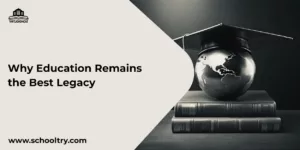Education is the bedrock of every successful society.Everyone who knows its value understands Why Education Remains the Best Legacy. A legacy that will continue to inspire people for a lifetime.
Education as we know it.

Education is a purposeful activity that aids achieving goals. Such goals include the transmission of knowledge, skills, and character traits. However, there is extensive debate regarding its exact nature beyond these general features. One approach is to view education as a process that occurs during educational events such as schooling, teaching, and learning.Another outlook understands education not as a process but as the product resulting from this process. It emphasizes the mental states and dispositions of a person that is knowledgeable.
Additionally, the term may also refer to the academic field that studies the methods, processes, and social institutions. It also involves teaching and learning. Although Having a clear idea of what the term means is important to correctly identify “education” itself. Since it also matters when trying to measure or improve them.The term “education” is from the Latin words educare, meaning “to bring up, rear, educate” in relation to the mind, and educere, meaning “to bring out, lead forth” in reference to the bodily level.
However, Some theorists provide precise definitions by identifying the specific features that are exclusive to all forms of education. Education theorist R. S. Peters, for instance, outlines three essential features of education:
- It is concerned with the transmission of knowledge and understanding.
- This transmission is worthwhile.
- It is usually in a morally appropriate manner in tune with the student’s interests.
Such precise definitions are characterizing the most typical forms of education. But they do so because there are counterexamples.This means that all the forms of education are similar to each other. But they need not share a set of essential features that all of them have in common. According to one view, the term “education” is context-dependent. This implies that its meaning varies depending on the situation.
Furthermore, There is disagreement in the academic literature on whether education is an evaluative concept. Thick definitions of education affirm this. Although, They state that it is part of the nature of education that it is beneficial to the student or leads to some kind of improvement.
Different thick definitions disagree about what kind of improvement. They contrast with thin definitions, which provide a value-neutral explanation of education.A distinction is between descriptive and prescriptive conceptions of education. Descriptive conceptions discuss how the term is actually used by regular speakers. Prescriptive conceptions express what good education is or how education should be practiced. Moreover, Many thick and prescriptive conceptions hold that education is an activity that tries to achieve certain aims. Some concentrate on epistemic aims, like knowledge and understanding. Others give more emphasis to the development of skills. Skills like rationality and critical thinking, and character traits, like kindness and honesty.
In addition, One approach is to focus on a single overarching purpose of education. Since one can see the more specific aims as means to this end. According to one suggestion, socialisation is the aim of education. It is usually by transmitting knowledge from generation to the next. This process can help a person to function in society as a regular citizen.
Why Education Remains the Best Legacy
01. Security and Stability:
Education equips individuals with the knowledge and skills needed to secure stable employment. Also individuals who have a proper education are generally more competitive in the job market. They have a better chance of finding and retaining employment. Although Higher education often leads to higher earning potential. This increase in income can provide financial security, and stability. This also helps in ensuring one’s ability to meet basic daily needs.
02. Enlightenment and Empowerment:
Education supports personal development and growth. This helps individuals to discover their talents, interests, and passions. It also makes it easier for people to find what they want to do and work on it. This self-awareness is empowering as it enables people to pursue their passion and purpose.
03. Purpose and Fulfillment:
A person that is educated has better job opportunities and career fulfillment. Having a meaningful career can significantly contribute to a person’s sense of fulfillment in life. Individuals with good quality education has higher chances of living better lives. They are able to achieve their aims since they have more knowledge and have a clear sense of purpose. Education can broaden an individual’s perspective by exposing them to diverse ideas, cultures, and global issues. This broader awareness can lead to a sense of fulfillment in both their personal and professional lives.
Conclusion
Education is not just a legacy; it is the ultimate legacy. It is the gift of enlightenment, empowerment, and endless possibilities.
Education is a legacy that transcends time, empowers individuals and communities, breaks the chains of inequality, and fosters innovation, understanding, and personal fulfilment. Education is a timeless treasure that enriches not only the minds but also the hearts of those who receive it. As we pass on this profound legacy to future generations, we invest in a brighter, more equitable,future for all.
Are you a school owner that needs a web solution that automates, digitises and transforms your entire school work? Click here to sign up for free.